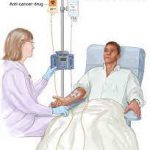Table of Contents
Why is carboplatin and pemetrexed prescribed?
Carboplatin and pemetrexed are a combination of two chemotherapy drugs. It is a treatment for:
- non small cell lung cancer (NSCLC)
- mesothelioma that started in the layers of tissue that cover the lung (pleural mesothelioma)
Pemetrexed is in a class of medications called antifolate antineoplastic agents. It works by blocking the action of a certain substance in the body that may help cancer cells multiply. Carboplatin is in a class of medications known as platinum-containing compounds. It works by stopping or slowing the growth of cancer cells.
How should carboplatin and pemetrexed be used?
You will be given carboplatin and pemetrexed in the chemotherapy day unit. A chemotherapy nurse will give it to you.
Your nurse will give you anti-sickness (anti-emetic) drugs before the chemotherapy. The chemotherapy drugs can be given through:

- a short thin tube the nurse puts into a vein in your arm or hand (cannula)
- a fine tube that goes under the skin of your chest and into a vein close by (central line)
- a fine tube that is put into a vein in your arm and goes up into a vein in your chest (PICC line).
Your nurse will give you pemetrexed and carboplatin through a drip (infusion). The pemetrexed will be given over 10 minutes. The carboplatin will be given over about an hour.
What side effects can carboplatin and pemetrexed cause?
Carboplatin and pemetrexed may cause side effects. Tell your doctor if any of these symptoms are severe or do not go away:
Infection
Bruising
Bleeding
Dizziness
SERIOUS SIDE EFFECTS
If you experience any of these symptoms, call your doctor immediately:
Kidney damage
Second cancer
Heart damage
Liver damage
In case of emergency/overdose
Contact your doctor or nurse immediately if you have signs of infection, including a temperature above 37.5C or below 36C.
What other information should I know?
It is important for you to keep a written list of all of the prescription and nonprescription (over-the-counter) medicines you are taking, as well as any products such as vitamins, minerals, or other dietary supplements. Bring this list each time you visit a doctor or if you are admitted to a hospital. It is also important information to carry with you in case of emergencies.
